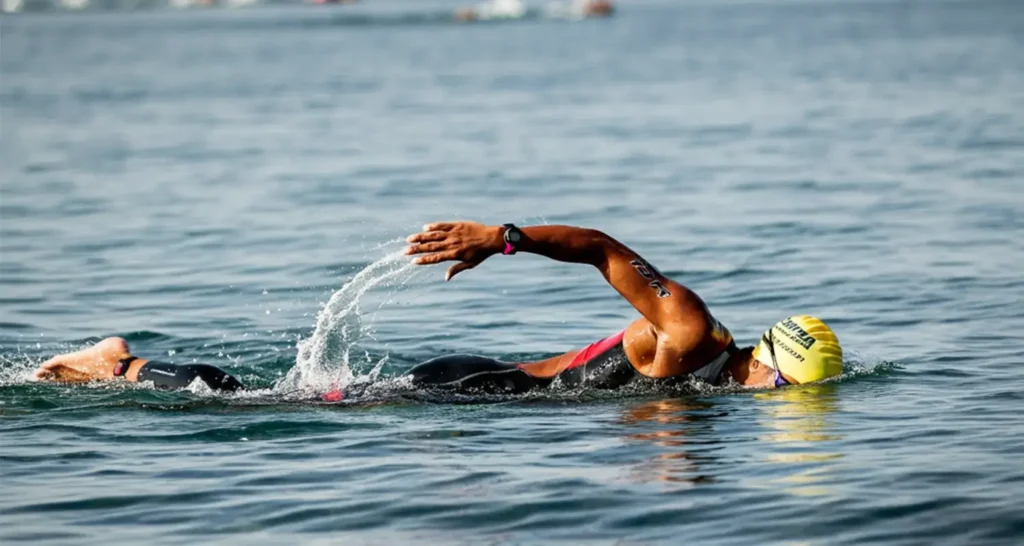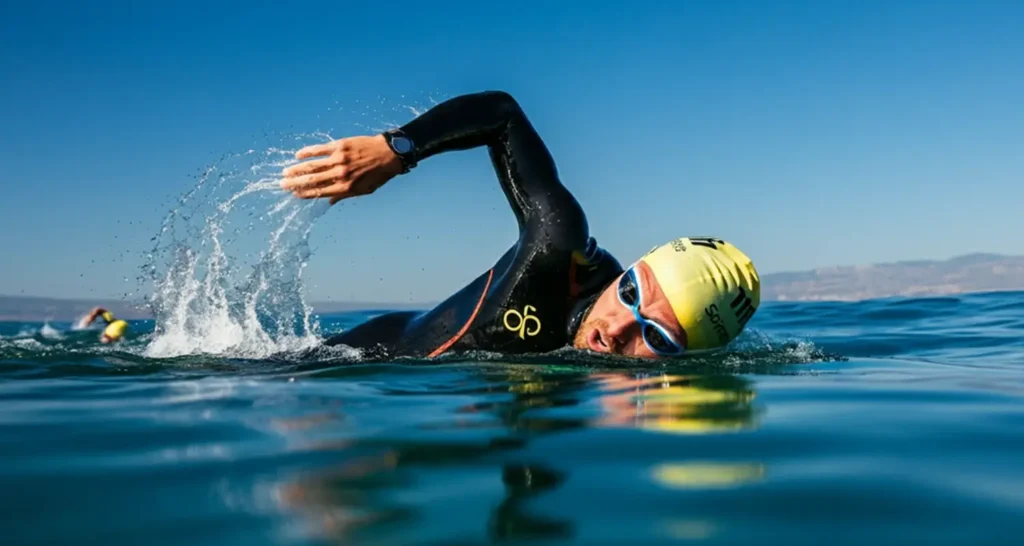
Picture this: You’re treading water in a cold lake, surrounded by splashing athletes. The starter horn blares, and suddenly you’re swimming in a chaotic whirl of arms and legs. This is why 72% of triathletes rank swimming as their most feared discipline. But here’s the good news—with the right preparation, you can transform panic into confidence with the right triathlon swimming tips.
Triathlon Swim Distances Demystified
| Race Type | Swim Distance | Beginner Time Goals |
|---|---|---|
| Sprint | 750m | 15-25 minutes |
| Olympic | 1500m | 30-45 minutes |
| Ironman | 3.8km | 1:10-1:45 hours |
Pro Tip: To estimate your race time, use this formula:
(Your pool 100m pace in seconds) x (race distance in meters ÷ 100) + 20% open water adjustment = Predicted time
Example: 2:00/100m pool pace → (120s x 7.5) + 20% = 18 minutes for a 750m sprint swim.
5 Costly Mistakes New Triathletes Make (And How to Avoid Them)
- Starting in the Middle
Why it’s bad: You’ll get kicked, swallowed by waves, and waste energy.
Fix: Start at the back or sides. Let faster swimmers clear out first. - Wearing Board Shorts
Why it’s bad: Drag slows you down by 15-20%.
Fix: Invest in a $90 tri suit (DHB Aeron) or rent a wetsuit. - Lifting Your Head to Sight
Why it’s bad: Your hips sink, killing momentum.
Fix: Practice “alligator eyes”—only lift your eyes above water, not your whole head. - Training Only in Pools
Why it’s bad: Open water feels alien on race day.
Fix: Do monthly lake/river swims. No access? Swim in a pool with blacked-out goggles. - Ignoring Transition Practice
Why it’s bad: You’ll stagger out of the water dizzy.
Fix: Do 1-2 “swim-to-bike” workouts weekly. Example: 10-minute swim → 5-minute transition → 30-minute bike.
Triathlon Swimming Tips: 7 Techniques for Success
- Sighting Like a Pro
- Lift your eyes every 6–8 strokes to spot buoys.
- Practice in the pool by placing a kickboard at the end of your lane.
- Drafting to Save Energy
- Position yourself 1–2 feet behind another swimmer to reduce drag by 25–30%.
- Open Water Survival Skills
- Start Strategy: Avoid crowds by starting at the edges if you’re a beginner.
- Temperature Adaptation: Acclimate to cold water with 2–3 pre-race cold swims.
- Bilateral Breathing
- Train yourself to breathe on both sides for balanced stroke development.
- Wetsuit Hacks
- Apply Body Glide to your neck to prevent chafing.
- Practice “floating” in your wetsuit to conserve energy.
- Pacing for Triathlon Swimming
- Aim for 80% effort to save legs for biking/running.
- Transition Prep
- Do 1–2 “swim-to-bike” brick workouts weekly to adapt to post-swim dizziness.
Triathlon Swimming Technique: 3 Drills to Master
1. Catch-Up Drill
- Purpose: Improve stroke timing & body rotation.
- How To: Keep one arm extended while stroking with the other.
- Sets: 4 x 50m with 15s rest.
2. Tarzan Drill
- Purpose: Boost head-up swimming ability for sighting.
- How To: Swim freestyle with eyes fully above water.
- Sets: 6 x 25m with 10s rest.
3. Fist Swimming
- Purpose: Strengthen forearm pull power.
- How To: Swim with closed fists.
- Sets: 8 x 25m with 20s rest.
Triathlon Swim Training Plan: 8-Week Program
Phase 1: Technique & Endurance (Weeks 1–3)
| Day | Workout | Focus |
|---|---|---|
| Monday | 2000m drill-focused swim | Form refinement |
| Wednesday | 3000m endurance sets | Base building |
| Friday | 10 x 100m race-pace intervals | Speed |
Phase 2: Open Water Simulation (Weeks 4–6)
- Add weekly open water sessions with sighting practice.
- Include 2–3 brick workouts (swim + bike).
Phase 3: Race Prep (Weeks 7–8)
- Taper volume by 20%.
- Practice full race rehearsals in your wetsuit.
Triathlon Swim Gear Guide
- Wetsuits:
- Full-sleeve: For water <65°F (e.g., Zone3 Vanquish)
- Sleeveless: For warmer water (e.g., Roka Maverick)
- Goggles:
- Mirrored lenses: Reduce glare in bright conditions.
- Anti-fog: Apply baby shampoo as a DIY solution.
- Tri Suits:
- Look for quick-drying fabrics with UV protection.
Race Day Strategies for Triathlon Swimming
Pre-Swim Routine
- Warm up with 10 minutes of easy swimming.
- Visualize your course route (buoy turns, exit points).
During the Swim
- First 200m: Stay calm – avoid the “washing machine” effect.
- Mid-Swim: Check pace every 5 minutes.
- Final 100m: Increase kick rate to boost blood flow to legs.
Common Mistakes to Avoid
- Starting too fast: 85% of triathletes burn out in the first 5 minutes.
- Neglecting transitions: Practice removing your wetsuit while running.
- Poor sighting: Adds up to 20% extra distance.
Next Steps to Dominate Your Swim
- Bookmark This Page: Return to the training plan weekly.
- Join a Local Group: Search “triathlon open water swim clinics near me.”
- Visualize Success: Spend 5 minutes daily picturing yourself gliding smoothly to the swim exit.
You’ve Got This! The triathlon swim isn’t about being the fastest—it’s about staying calm, efficient, and ready to crush the bike and run.
Conclusion
Mastering triathlon swimming requires technique, strategy, and mental grit. Use this guide’s tips, drills, and training plans to transform your swim from a weakness to a strength. Remember: Even Olympic champions were once beginners!
FAQs: Triathlon Swimming
12–16 weeks for beginners. Focus on gradual distance progression.
2:00-2:30 per 100m in pools. Add 20-30 seconds for open water.
Practice “float breaks” – roll onto your back to regroup.


Pingback: How to Master the Half Ironman Swim - besttriathletes.com
Pingback: 16-Week Ironman 70.3 Training Plan for Beginners - besttriathletes.com
Pingback: Why Choose a Sprint Triathlon? - besttriathletes.com
Pingback: The Ultimate Triathlon Training Plan for Every Athlete - besttriathletes.com
Pingback: Open Water Swimming Technique for Triathlons: Sighting & Drafting - besttriathletes.com